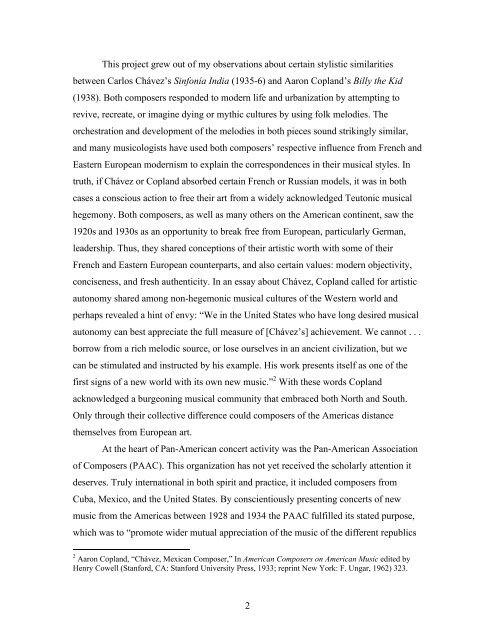Collective Difference: The Pan-American Association of Composers
Collective Difference: The Pan-American Association of Composers
Collective Difference: The Pan-American Association of Composers
You also want an ePaper? Increase the reach of your titles
YUMPU automatically turns print PDFs into web optimized ePapers that Google loves.
This project grew out <strong>of</strong> my observations about certain stylistic similarities<br />
between Carlos Chávez’s Sinfonía India (1935-6) and Aaron Copland’s Billy the Kid<br />
(1938). Both composers responded to modern life and urbanization by attempting to<br />
revive, recreate, or imagine dying or mythic cultures by using folk melodies. <strong>The</strong><br />
orchestration and development <strong>of</strong> the melodies in both pieces sound strikingly similar,<br />
and many musicologists have used both composers’ respective influence from French and<br />
Eastern European modernism to explain the correspondences in their musical styles. In<br />
truth, if Chávez or Copland absorbed certain French or Russian models, it was in both<br />
cases a conscious action to free their art from a widely acknowledged Teutonic musical<br />
hegemony. Both composers, as well as many others on the <strong>American</strong> continent, saw the<br />
1920s and 1930s as an opportunity to break free from European, particularly German,<br />
leadership. Thus, they shared conceptions <strong>of</strong> their artistic worth with some <strong>of</strong> their<br />
French and Eastern European counterparts, and also certain values: modern objectivity,<br />
conciseness, and fresh authenticity. In an essay about Chávez, Copland called for artistic<br />
autonomy shared among non-hegemonic musical cultures <strong>of</strong> the Western world and<br />
perhaps revealed a hint <strong>of</strong> envy: “We in the United States who have long desired musical<br />
autonomy can best appreciate the full measure <strong>of</strong> [Chávez’s] achievement. We cannot . . .<br />
borrow from a rich melodic source, or lose ourselves in an ancient civilization, but we<br />
can be stimulated and instructed by his example. His work presents itself as one <strong>of</strong> the<br />
first signs <strong>of</strong> a new world with its own new music.” 2 With these words Copland<br />
acknowledged a burgeoning musical community that embraced both North and South.<br />
Only through their collective difference could composers <strong>of</strong> the Americas distance<br />
themselves from European art.<br />
At the heart <strong>of</strong> <strong>Pan</strong>-<strong>American</strong> concert activity was the <strong>Pan</strong>-<strong>American</strong> <strong>Association</strong><br />
<strong>of</strong> <strong>Composers</strong> (PAAC). This organization has not yet received the scholarly attention it<br />
deserves. Truly international in both spirit and practice, it included composers from<br />
Cuba, Mexico, and the United States. By conscientiously presenting concerts <strong>of</strong> new<br />
music from the Americas between 1928 and 1934 the PAAC fulfilled its stated purpose,<br />
which was to “promote wider mutual appreciation <strong>of</strong> the music <strong>of</strong> the different republics<br />
2 Aaron Copland, “Chávez, Mexican Composer,” In <strong>American</strong> <strong>Composers</strong> on <strong>American</strong> Music edited by<br />
Henry Cowell (Stanford, CA: Stanford University Press, 1933; reprint New York: F. Ungar, 1962) 323.<br />
2
















